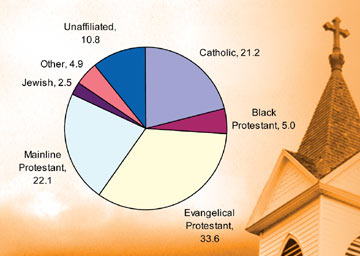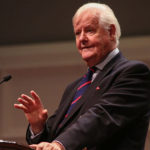Posted: 9/29/06
Snapshots of piety in America
By Hannah Elliott
Associated Baptist Press
WACO (ABP)—Americans may not be losing their religion after all, according to a new Baylor University study on faith in the United States. The results of the recently released study by Baylor’s sociology department and Institute for Studies of Religion show, among other things:
| See Related Articles: • Snapshots of piety in America • Americans hold four views of God, research shows • View the entire Baylor University Religion Survey report as a pdf file here. |
• The majority of people not affiliated with any religion still believe in God, and one-third pray at least occasionally.
• Nearly 11 percent of people who claim no affiliation with a religion attend church at least once a month.
| (Photo illustration by David Clanton) |
• One out of 10 people with no religious affiliation firmly believes Jesus is the son of God.
The study, called “American Piety in the 21st Century,” is the most extensive of its kind. Funded by the John Templeton Foundation and developed with help from the Gallup Organization, it involved data from 1,721 people who responded to a mailed survey. The questionnaire contained 350 queries, dealing with everything from prayer habits and religious labels to Christian consumer spending and belief in the paranormal.
The survey sheds new, detailed light on America’s religious picture, Baylor President John Lilley said.
Byron Johnson, co-director of the institute and a professor of sociology at Baylor, explained that the report had significance in another way, too. While other noted religious surveys asked general questions—like “Do you believe in God?” and “Do you pray?”—the Baylor report followed those preliminary questions with more probing inquiries.
For example, if respondents answered that they did indeed pray, they also had to detail when they prayed, to whom, why, and the reason for the prayer. In general, the research team aimed to “dig down deep,” Johnson said.
That probing apparently paid off, particularly in the data the survey gathered regarding religious self-identification.
In recent years, other studies have concluded that Americans are becoming more secular, at least when it comes to church attendance and membership in faith communities. From 1988 to 2004, for instance, the number of religious “nones”—people who claim no affiliation with any congregation or religious group—rose from 8 percent to 14 percent, according to one study.
But Kevin Dougherty, a Baylor sociology professor and research fellow at the institute, thinks supposed secularization is mainly a function of how survey questions are asked, rather than a real decline in religious belief or practice.
 |
“A fundamental question for anyone studying religions is, ‘Are Americans losing their religion?’” he said. “The reason why this is such a big question is there is some evidence … that some people in fact are losing their religion. If it is true, it reveals a tremendous amount of secularization occurring in our society.”
Fortunately, that’s probably not the case, he said. In fact, the new study suggests fewer Americans live their lives completely outside of organized religious life than previous survey results have suggested.
That, Dougherty said, is because the Baylor study asked far more detailed questions of respondents than previous studies.
When researchers take the time to ask about people’s religious activity on the local level, only about one in 10 Americans ends up having no connection to a religious community, he noted.
“We found that almost a third of people who said ‘I don’t know my religion’ five questions later gave us the name of a congregation” whose services they attend, the sociology professor said. “There were 10 million Americans over-counted as religious ‘nones.’”
Previous surveys in the area would not have picked up that subtlety, Dougherty said. He added the new results also indicate a larger trend: People are better able to identify with a local place of worship than with a national denomination. For instance, fewer people today think of themselves as Southern Baptists than as members of a particular congregation.
Many survey respondents may not even know the name of the denomination to which their church or synagogue belongs.
“Rick Warren is a Southern Baptist preacher. (Warren’s) Saddleback Church is a Southern Baptist church,” Dougherty said, referring to one of the nation’s largest and most prominent congregations, located near Los Angeles. “Do the 20,000 people who worship there every weekend know they are Southern Baptist? For many, probably not.”
For Dougherty and his colleagues, the survey’s bottom line is the discovery that, when religious classifications are dismissed, statistics change. Case in point: 2006 estimates by the highly respected Barna Group list 20 million evangelicals in America. According to the Baylor report, fully a third of Americans are affiliated with evangelical Protestant congregations, even if they don’t exactly identify with evangelicalism as a whole or with an evangelical denomination. Given current population figures, that translates into about 100 million Americans affiliated with evangelical Protestantism.
“Denomination just doesn’t mean as much to people today as it has in the past,” Dougherty said.
Such differences could usher in a new methodology for religion surveys—and a more accurate picture of the nation’s still-vibrant religious life.















We seek to connect God’s story and God’s people around the world. To learn more about God’s story, click here.
Send comments and feedback to Eric Black, our editor. For comments to be published, please specify “letter to the editor.” Maximum length for publication is 300 words.